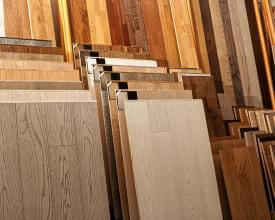DHA eNews - Duties On Engineered Wood Flooring From China Will Continue
In another big win for U.S. workers and the many DHA members in the American Manufacturers of Multilayered Wood Flooring coalition, last week the U.S. International Trade Commission ruled that the existing duties on Chinese engineered wood flooring will remain in place for the next five years. This is a critical development for the industry, which has been fighting unfair imports from China for years. This comes about a month after a similar ruling on hardwood plywood.
Government policies can have a big impact on our industry. That's why I was thrilled to join other hardwood industry leaders at the Hardwood Federation Fly-In. We met with U.S. senators and representatives from both sides of the aisle to advocate that policy recognize the carbon benefits of hardwood products and to advocate for specific policies that will support our industry, workers, the environment, and rural communities. Please contact me if you’d like to hear more about it or join us next year. All DHA members are welcome.
If you have questions or comments, contact me. I look forward to hearing from you.

Keith A. Christman, President
Decorative Hardwoods Association

By a vote of 5 to 0, the U.S. International Trade Commission decided that eliminating the existing antidumping and countervailing duties on wood flooring from China would result in material injury to the U.S. wood flooring industry. The existing duties will continue for another five years. This decision falls under the five-year sunset review process, required by the Uruguay Round Agreements Act, and follows a similar ruling by the Commerce Department.
Last week, 65 hardwood industry leaders participated in the 2023 Fly-In to Capitol Hill. We met with more than 100 legislators in the House and Senate, from both sides of the aisle, to discuss the climate benefits of hardwoods, the farm bill, and tax policy.
The California Air Resources Board will stop processing no-added formaldehyde and ultra-low emitting formaldehyde exemption applications on July 14. Historically, CARB has been the primary issuer of exemptions. Capital Testing will begin offering NAF and ULEF exemption services in July.
The U.S. Department of Agriculture will invest more than $43 million to expand innovative uses of wood, including as a construction material in commercial buildings, as an energy source, and in manufacturing and processing input for wood products used in framing homes.
In the first four months of this year, total imports of hardwood plywood fell by 65% in volume and by nearly 70% in value vs. last year. Imports of hardwood plywood declined in every one of the top 10 countries except Ecuador. Last year, U.S. imports of hardwood plywood grew by 12% in value to more than $2.1 billion. This year, importers appear to be working off high inventories.
Last year, U.S. imports of engineered wood flooring increased by 11% in volume. This year, through April, imports have dropped by more than 37%. Nearly all countries saw a decline in the value of imports.
A bipartisan group of senators introduced the Import Security and Fairness Act, designed to stop imports from entering the U.S. without paying duties, taxes, and fees—and therefore unfairly competing in the U.S. market. Right now, packages with a value of less than $800 in value are exempt from duties. The number of these packages has exploded to about two million packages per day.
Canada's emergency preparedness minister says this year's wildfires are some of the most severe ever seen. The Donnie Creek wildfire, now covering nearly 1,000 square miles, is the second-largest fire in British Columbia's history. At the beginning of June, 424 fires were burning across Canada; more than 250 were considered to be out of control. Canada expects to rely on international help to fight wildfires in the coming years.
Source: CTV News
The Forest Products Association of Canada said that the country's foresters manage more than 1.7 million acres and that Canada has lost about six times that amount already. Wildfires are forcing some forestry companies to pause operations.
Source: Toronto Star
The number of states where trees are battling beech leaf disease tripled from 2019 to 2022. Beech trees can reach 40 meters tall, live up to 400 years, and are among the most abundant forest trees in the Northeast and Midwest U.S. Near Lake Erie, half of the beech trees examined have contracted the disease.
Oak wilt, which could become a significant threat to Canada's trees, has been reported in Niagara Falls. This is the first confirmed case of oak wilt in Canada. The Canadian Food Inspection Agency is working with the city to destroy affected trees to prevent the spread of the disease.
Mass timber construction originated in Europe and is slowly growing in popularity across North America. Mass timber buildings are made from engineered wood, which is usually lighter and faster to build with. Constructed off-site, mass timber elements are then installed right onto the structure. This makes mass timber buildings more cost-effective to build, which could help make housing more affordable.
Australia plans to build a 52-story commercial office tower in Sydney, the world's tallest hybrid timber building. It will cover about 550,000 square feet and include retail facilities.
A French carpenter has built a Citroen 2CV car of wood. Michel Robillard spent around 5,000 hours over five years creating a car that is nearly all wood, right down to its wooden seats. The car was recently sold for €210,000.
Source: Carscoops
What U.S. hardwood tree is facing the greatest threat, right now?





